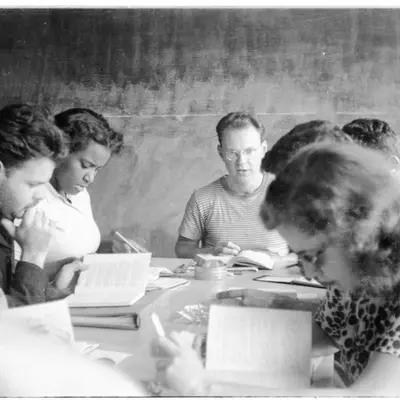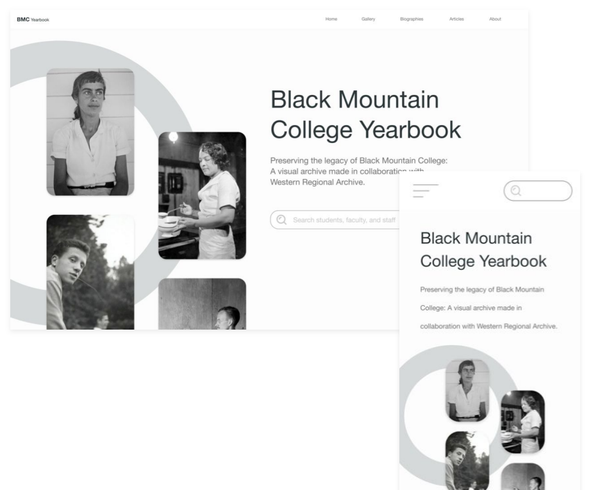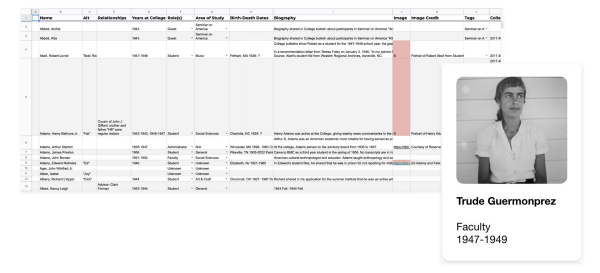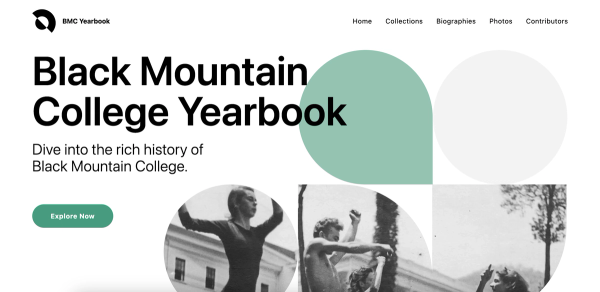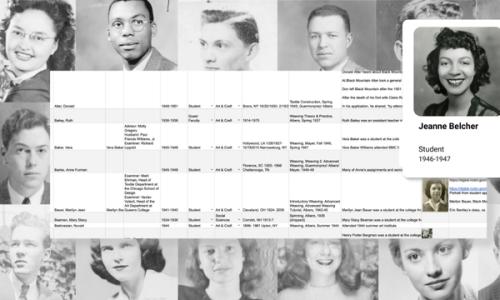
Mar 30, 2024
The making of a digital archive
How the BMC Yearbook came to be
If you've seen any of the content on my website thus far, you'll see that I had a previous career working in museums and archives. I worked in lots of roles and departments over the span of a decade, but once I chose something I wanted to get good at, I primarily worked on collections management and digital preservation projects.
The last digitization project that I worked on while in the field was with the Asheville Art Museum, getting their Black Mountain College archival collection accessioned, digitized, transcribed, and properly stored to further research and to put on their website for public access.
first off, for those that aren't familiar...
What is Black Mountain College?
Black Mountain College was a private liberal arts college in Black Mountain, North Carolina. It was open from 1933 to about 1957 and was known for it's progressive, experimental take on education. Many noteable artists, writers, and musicians came through as guests, students, and faculty in it's short twenty four years. I'd encourage you to look around at more descriptions of the college from the Black Mountain College Museum and Art Center, or this New York Times article, "Why are we still talking about Black Mountain College?"
now back to the story...
For the entirety of 2022, I worked on this project part-time, painstakingly entering archival documents into our collections management system, taking photographs and editing them, writing metadata, organizing physical and digital files, transcribing EVERY WORD of every document, and creating training videos for future preservation projects at the museum.
The bulk of the objects that I digitized was printed bulletins that Black Mountain College released to inform current and prior students and faculty of what was happening at the college. These bulletins often shared performances happening that week, what the farm worked on, what students were doing, like taking their senior examination or taking a field trip with faculty. Needless to say, I learned a whole lot about the day to day life at the college. I learned a lot about the individuals, many of which didn't go on to be famous artists or poets, but participated in and contributed to the progressive and experimental environment of the college every day.
Something that I became particularly interested in was that the college held a Negro History Week for the student body in 1943. For a southern, white college to hold an event celebrating African American contributions to our history before nation wide desegregation, I was naturally curious how this event came about, what they talked about, who joined the event, how it influenced the college's eventual admittance of African American students and faculty just a few years later.
I started looking into faculty that participated in the event, like Robert Wunsch, the theater director and for a short time, the rector of the college. I couldn't find much information online about him, other than the well-known stories of the college like the fact that he found the location for the college and how he was forced to leave the college (read more about him in his biography, here). I found that he very often interacted with African American schools around North Carolina, regularly traveled to and spoke at conferences about race, desegregation, and generally supporting African American schools to better their educational programming.
I visited the Western Regional Archive branch of the NC State Archives to read through the Robert Wunsch faculty file, part of the much larger BMC archival collection at their Asheville, NC location. I learned more about Wunsch during his time at the college, Negro History Week, and the Rosenwald Fund (which you can read more about in my writing below). His life beyond the college is still a bit of a mystery, aside from stories told by students and faculty of his whereabouts.
From here, I started looking deeper into the students that attended the college that were African American (roughly a dozen students), Native American, Japanese American, and refugees from Germany. I started making connections between the students and faculty and tried to track the years they were there and classes they took. This ultimately turned into a conference talk and the start of a PhD thesis proposal about the Interracial Program at BMC.
I started a Google Sheets around the summer of 2022 and added individuals with their date of birth and death if I knew it, if they had a nickname, the relationships they had within the college, the times they were at the college, biographical information, links to outside resources, and I eventually started adding photos to a Google Drive to add to my alumni sheet. I did this for the rest of the year, adding in snippets from college bulletins as I came across names. A painstaking process, but really helped me to make connections within the college.
I wasn't sure even at this point what this resource would be for or if it would be useful to anyone but myself as I wrote about this network of people. I also started a new relationship in the summer of 2022 and spoke about the project with my partner, with a vague idea of some academic project that it could contribute to. Him being a software engineer, he immediately started mapping out a relational database on a white board of his office. We imagined what a polished digital archive could look like and how me from six months ago could have really benefitted from a database of students and faculty to search through, so surely someone else out there could be in the same boat.
I continued the Sheets database until the end of the year and the end of my contract with the museum and started working on little pieces of the digital archive when I could. I took a UI UX bootcamp in early 2023 and made Figma and XD mockups of the site. I then took a software bootcamp in the summer of 2023, lots of workshops, and worked small gigs to improve my skills enough to build the site. By fall of 2023, I started a PhD program in Digital History at Clemson University, where I really jumped straight into the world of digital humanities.
Even in the middle of studies, I didn't want to lose momentum on the archive site. I applied for grants, continued working on it myself, and of course my partner was a huge help and really set the backbone of the site while I worked on building those skills.
I spent many long days in the archive throughout 2023, going through EVERY file for students, faculty, and staff (which, as of 4/24, I'm still doing!). Lead archivist at WRA, Heather South, has really put in the hours as well, tracking down where people went after the college, finding them mentioned in newspapers, and just generally being my biggest cheerleader. She has so much knowledge about the collection just stored in her head at all times, I have loved every second in the archive just picking her brain. Heather and I unveiled the pilot site at the Black Mountain College Reviewing conference in October of 2023.
The more I read and add to the site, the more connections I make between the individuals of the college, and the more connected I feel to their stories. Following friendships and marriages (and affairs..), following the creation of other progressive schools and art co-ops, I can see the impact that Black Mountain College has had on so many people's lives.
This project has been really special to me and I'm really proud of how it's turned out, and very appreciative for all of the opportunities it's led me to. It's made me realize that though I love being lost in boxes of archives and writing academic papers on topics that interest me, the real motivation to the work I've always done is sharing information in ways that will be engaging and accessible to more people. Now others are contributing research to the site and telling me how it has been useful to their exhibitions about BMC or research about their parents that were BMC alumnus.
Needless to say, I'd love for anyone to check out the site! www.bmcyearbook.org and work on any other digital archive project in the future. Please feel free to email me at hello@mandyhartman.dev or reach out on Twitter!
Photos below,
Photo of Delores Fullman in a classroom at BMC, courtesy of Western Regional Archive; initial mockups for grant applications; original sheets database with a biography card mockup; current site (as of 4/24).
Gallery
